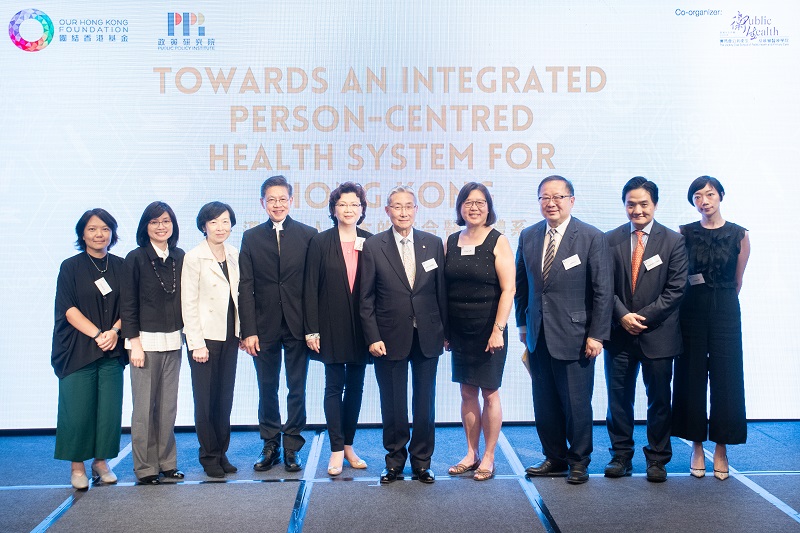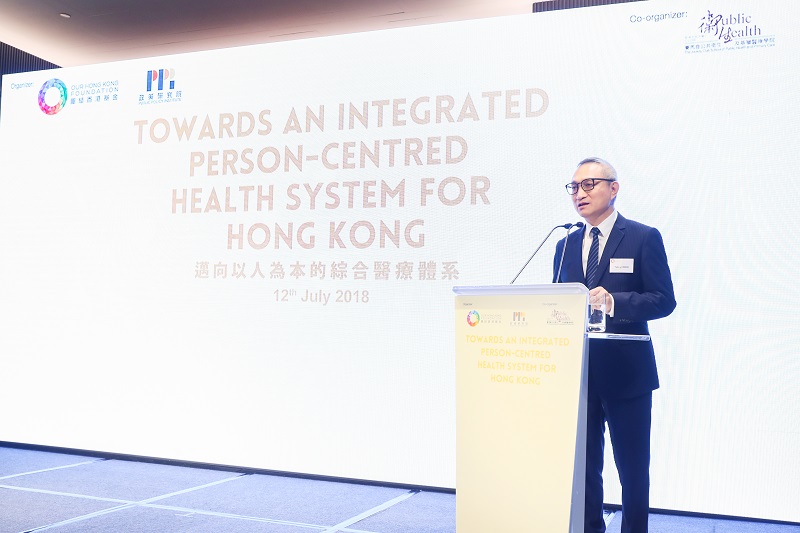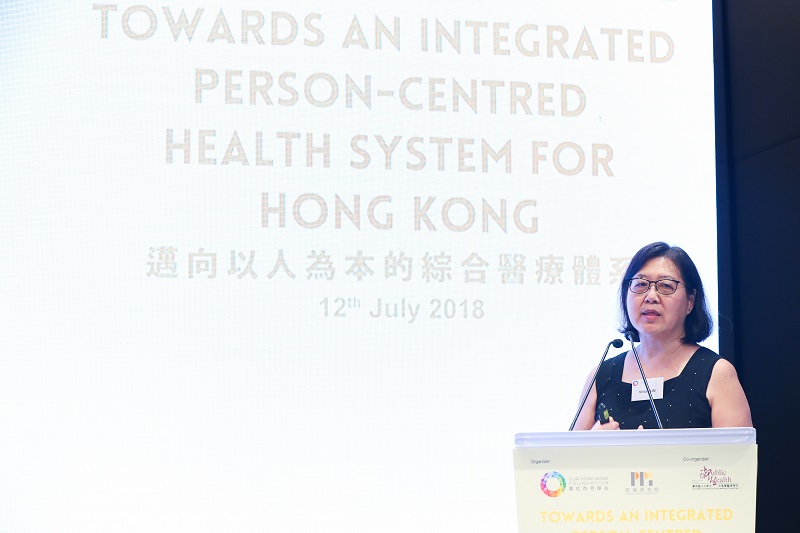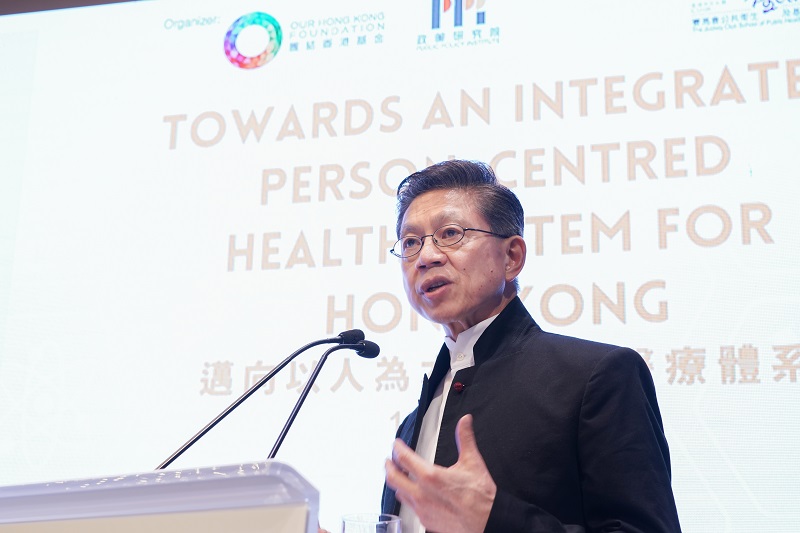Our Hong Kong Foundation Calls for a Paradigm Shift in Health System Orientation
Gearing Hong Kong towards an integrated person-centred approach essential for efficiency and sustainability of the health system in the 21st Century

(July 12, 2018, HONG KONG) – Health systems around the world are generally not fit for 21st century challenges. Health systems are increasingly challenged to effectively and efficiently cater for populations that are living longer and the growing burden of costly chronic conditions requiring complex interventions.
Our Hong Kong Foundation (“OHKF”), in collaboration with The Jockey Club School of Public Health and Primary Care, The Chinese University of Hong Kong, today organized a forum “Towards an Integrated Person-Centred Health System for Hong Kong”. Prominent guests and speakers included Dr. Chui Tak-yi, Under Secretary for Food and Health; Dr. Vivian Lin, Director, Division of Health Systems, World Health Organization, Regional Office for the Western Pacific; Professor John Chi-yan Leong, Chairman of Hospital Authority; Dr. Donald Li, SBS, OStj, JP, President-Elect, World Organisation of Family Doctors (WONCA); and Professor Eng-kiong Yeoh, GBS, OBE, JP, Director, The Jockey Club School of Public Health and Primary Care, Faculty of Medicine, The Chinese University of Hong Kong. The speakers engaged in an expert discussion on the transformation of health systems to better cater for Hong Kong’s fast-growing ageing population and tackle the increasing burden of chronic conditions associated with escalating healthcare costs.
Mrs. Eva Cheng, Executive Director of OHKF pointed out that with population ageing and the corresponding burden of chronic illnesses ever increasing, there is an urgent need to find out where we are today and where we want to be at a system level. Our next research report will focus on the challenges within our health system today, identify the gaps which need to be bridged to realize a better healthcare system.
In her keynote speech, Dr. Vivian Lin highlighted the existing situation of global health systems. "We at WHO believe that people-centred, integrated health services, with primary health care as the core, is the foundation for universal health coverage.”
Professor Eng-kiong Yeoh, who also serves as a member of the OHKF Research Council and as Lead of Healthcare and Ageing Policy Research, pointed out in his keynote speech that Hong Kong needs to reorganize its health system to make it fit for purpose in the 21st century, “We need to move towards a health system that can provide services rooted in primary, ambulatory and community care coordinated across the patients’ journey in the transition of care to be able to meet the holistic needs of our ageing population.”
The urge for a fit-for-purpose health system
A panel discussion was conducted with the two keynote speakers Dr. Vivian Lin and Professor Eng-kiong Yeoh, together with Professor John Chi-yan Leong, Dr. Donald Li and moderated by Mr. Stephen Wong, Deputy Executive Director and Head of Public Policy Institute of OHKF. The panel speakers consensually called for a reorientation of the health service model towards primary, ambulatory and community care which will not only relieve the pressure on the public health system but also address the needs of all people holistically beyond acute illnesses, making the system fit for purpose in the 21st century. This rebalanced system will 1) focus on the overall health and well-being of all people; 2) prioritise health promotion, disease prevention, chronic disease management, disability reduction and maximize functional capacity; and 3) improve access in the delivery of healthcare services for the population of Hong Kong.
A key takeaway in today’s discussion was how the design of health systems around the world – including that of Hong Kong – had largely been focused on providing acute hospital-centric care. More importantly, Hong Kong’s paradigm in the orientation of primary, ambulatory and community care has been that of a supplementary role to hospital care. Critically, these are key areas of service provision which need to be enhanced to cater to the changing needs and demands attributable to demographic and epidemiological shifts, created by increasing prevalence of chronic diseases. In Hong Kong, 7% of those aged 45-49 and as many as 50% of those aged 70 or above were multi-morbid (two or more chronic illnesses). The underdevelopment of these health service modalities was described as a contributor to prevalent issues within Hong Kong’s health system, including the overcrowding of public hospital emergency rooms and hospitals that have essentially had to deal with far more cases than they were designed to handle. Swift action to develop these key areas is essential.
The panel also noted the distinct fragmentation and segmentation of the local health system. Currently, 46.8% of hospital admissions are attributable to conditions which are either potentially preventable or could be cared for in ambulatory or primary care outside the hospital setting. This indicates inadequate primary care, ambulatory and community-based care to better manage chronic disease and inadequate integration between health services at different levels of care.
In this context, a demand-supply and supply-mix mismatch in healthcare services will likely continue to widen and lead to an even greater challenge in Hong Kong where public hospitals are overloaded, waiting periods for seeing a doctor are prolonged, and accessibility to health services is regressively limited. The failure to properly position Hong Kong’s health system for the aged and chronically ill can be significantly detrimental in terms of access to health care, cost effectiveness and eventual outcomes.
Professor Eng-kiong Yeoh added that there is still a lot of work to be done in this area. “Research at OHKF is seeking to identify entry points to refocus our health system, as well as the routes in a journey to make it ‘fit for purpose’. We anticipate key findings to be released by the end of this year.”







